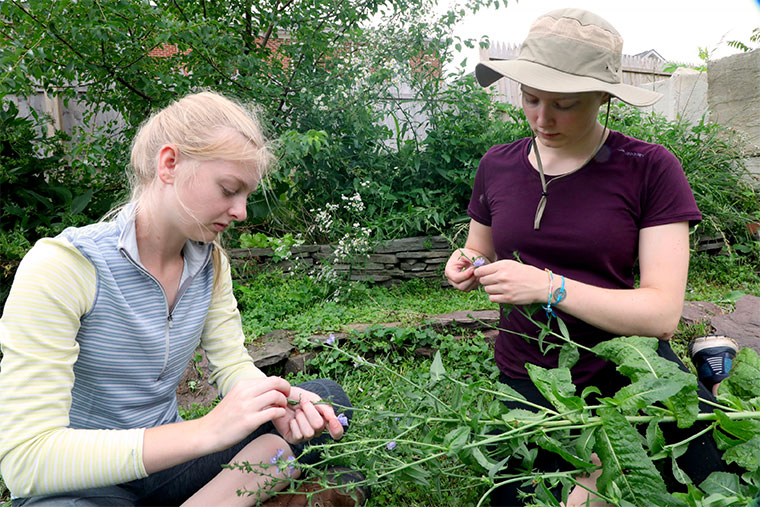Summer with the Food Initiative
June 14, 2019
Food Initiative interns are researching wild foods, mastering culinary skills, growing produce, and rethinking the food system.
Nicole Hatfield '21 got an introduction to the Food Initiative philosophy through a permaculture internship during her freshman year. Now the English major is one of the first participants in the Rebecca Corbin Loree Internship Program, which provides funding for campus summer employment. Hatfield is spending her summer working with the Food Initiative to, as she says, “demystify the process of cooking homemade, nutrient-dense, sustainable food.”
Hatfield is at the helm of Food Initiative summer activities alongside Analiese Bush '22, who balances her role as an Food Initiative intern with her responsibilities as a campus garden intern. They're joined by Charlie Wittich '21, a history major who is developing a healthy and ecologically-oriented meal plan for athletes. Together, they are immersed in a world of lacto-fermentation, foraged cuisine, and regenerative food production.
“Our work with the Food Initiative is important because it allows the community to see firsthand how simple sustainable eating can be,” Hatfield explains. “Most of the ingredients we use are familiar or grow in our campus garden. Along with showing people how to prepare real food, the Food Initiative promotes environmental sustainability and provides the public with important educational resources.”
“We are aiming to pull back the curtain that has obscured our senses of how we acquire and consume our food,” Bush adds. “We are reconnecting everyone with where food comes from and we are encouraging others to look critically at what is in their cabinets and refrigerators and to challenge the ways in which we view food.”
Their daily efforts are rooted in food scraps that they turn into compost to grow herbs, vegetables, and fruit at the campus garden. Microbial allies are constant companions as they ferment vegetables and beverages to enhance probiotic value and bioavailability of nutrients. Through fermentation, sprouting, and cooking, they learn to neutralize anti-nutrients and toxins in food, and study patterns of eating that enhance nutrient absorption.
“Learning about the way humans used to eat has changed the way I look at nutrition, and from an environmental standpoint, how my diet affects the world around me,” says Wittich.
“My eyes have been opened to how rich we are with ecosystem services and the extensive bounty of nature,” Bush says. “From wild native species growing in our very own backyards to the microbiomes living in our large intestines, I had no idea how much wonderful life was around me at all times. Food is everywhere and it is beyond what you find on the supermarket shelves. Food is nutrient-dense and alive.”
Their work sometimes leads them in unexpected directions. One day they were asked to help install a trap to remove honeybees from the roof of Reid Hall. Another time they were filmed in a segment for Maryland Public Television. Then came the request to design a cricket terrarium in the greenhouse of the John S. Toll Science Center. Hardly a day goes by that they don't pluck an edible flower for use in their cooking, guided by ethnographic research and trust in their palates.
Wittich particularly appreciates the advanced knife skills he's gained while preparing batches of sauerkraut, and he has a newfound appreciation for bacteria and fermentation.
Bush has discovered a penchant for dairy fermentation: “Holy cow, I never knew it was so simple. And delicious! Making butter is so enjoyable and the results are definitely worth the effort,” she says. “Tasting real milk for the first time was equally wild. Simply divine and so good for you.”
“The Food Initiative has inspired me to cook more and make the process of eating a thoughtful, careful, and meditative experience — rather than a mindless action,” Hatfield says.
Their work promotes use of traditional fats and salt, creativity with herbs, and a sense of defiance toward the standard American diet:
“I have been challenged to challenge the way that I have approached food my whole life. There is so much untapped potential,” Bush says.
And they think deeply about safeguards in industrial food processes: “Pasteurization takes nutrients out of food and destroys all of the helpful microorganisms,” says Hatfield.
All the while, the Food Initiative interns are contemplating how to create a culture that, Hatfield explains, “brings people closer to their food and educates the public about how to improve their environmental impact.”
“The work we are putting in with the Food Initiative is incredibly pertinent to the health of ourselves as human beings,” Bush says. “We are learning not only to take care of ourselves, which ultimately reverberates into care for nature, but to take care of our stories and our histories. We are establishing a permanent culture rooted in sturdy ethics and morals to prolong the well-being of humanity and to encourage reflection about the way that we live in our environments.”
Only a few weeks into the summer internship, they have covered a lot of ground. Hatfield looks forward to reading more about the philosophy behind permaculture, sustainable food, and environmental stewardship. “I can't wait to spend hours in the garden building healthy soil and discovering new plants,” she says. “I am so excited to use campus garden ingredients to create something delicious and nutritious.”
Bush links the future of food to our ancestral heritage. “I am learning so much priceless information about native plants, America's and the world's cultural foodways, and ways to feed our communities healthfully in the present and in the future.”
